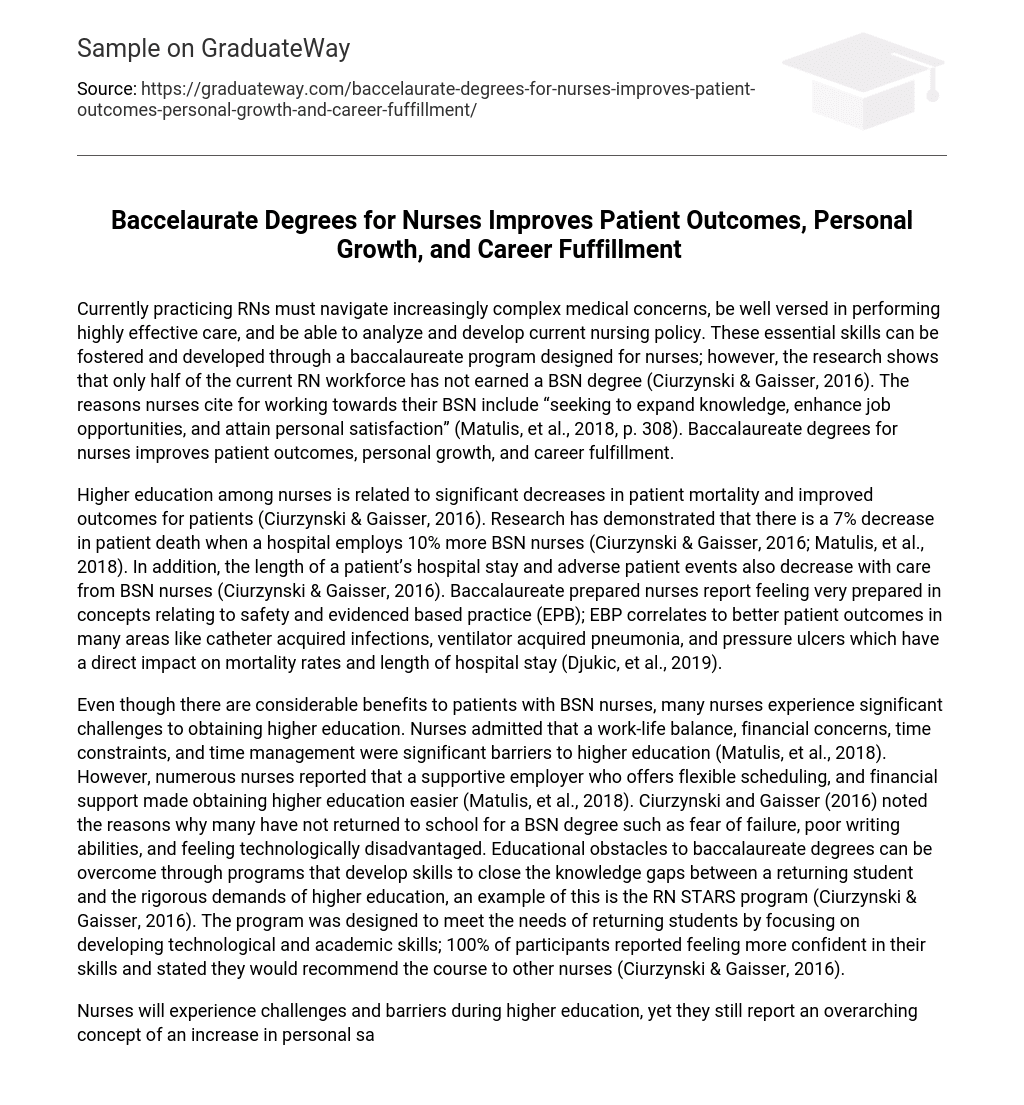Currently practicing RNs must navigate increasingly complex medical concerns, be well versed in performing highly effective care, and be able to analyze and develop current nursing policy. These essential skills can be fostered and developed through a baccalaureate program designed for nurses; however, the research shows that only half of the current RN workforce has not earned a BSN degree (Ciurzynski & Gaisser, 2016). The reasons nurses cite for working towards their BSN include “seeking to expand knowledge, enhance job opportunities, and attain personal satisfaction” (Matulis, et al., 2018, p. 308). Baccalaureate degrees for nurses improves patient outcomes, personal growth, and career fulfillment.
Higher education among nurses is related to significant decreases in patient mortality and improved outcomes for patients (Ciurzynski & Gaisser, 2016). Research has demonstrated that there is a 7% decrease in patient death when a hospital employs 10% more BSN nurses (Ciurzynski & Gaisser, 2016; Matulis, et al., 2018). In addition, the length of a patient’s hospital stay and adverse patient events also decrease with care from BSN nurses (Ciurzynski & Gaisser, 2016). Baccalaureate prepared nurses report feeling very prepared in concepts relating to safety and evidenced based practice (EPB); EBP correlates to better patient outcomes in many areas like catheter acquired infections, ventilator acquired pneumonia, and pressure ulcers which have a direct impact on mortality rates and length of hospital stay (Djukic, et al., 2019).
Even though there are considerable benefits to patients with BSN nurses, many nurses experience significant challenges to obtaining higher education. Nurses admitted that a work-life balance, financial concerns, time constraints, and time management were significant barriers to higher education (Matulis, et al., 2018). However, numerous nurses reported that a supportive employer who offers flexible scheduling, and financial support made obtaining higher education easier (Matulis, et al., 2018). Ciurzynski and Gaisser (2016) noted the reasons why many have not returned to school for a BSN degree such as fear of failure, poor writing abilities, and feeling technologically disadvantaged. Educational obstacles to baccalaureate degrees can be overcome through programs that develop skills to close the knowledge gaps between a returning student and the rigorous demands of higher education, an example of this is the RN STARS program (Ciurzynski & Gaisser, 2016). The program was designed to meet the needs of returning students by focusing on developing technological and academic skills; 100% of participants reported feeling more confident in their skills and stated they would recommend the course to other nurses (Ciurzynski & Gaisser, 2016).
Nurses will experience challenges and barriers during higher education, yet they still report an overarching concept of an increase in personal satisfaction, career growth, and personal development (Matulis, et al., 2018). As stated in Matulis et. al (2018) nurses reported feelings of increased belief in oneself as evidenced by respondents’ statements of, “School… gave me confidence” and “I just feel better about my job now… before… I’m just here to do my job and I walk out;” also reported “BSN makes you a better nurse” (p. 308). In addition to positive feelings regarding their career many respondents stated further career advancement as a benefit of BSN completion (Matulis, et al., 2018). For example, a BSN degree often increases career opportunities, for instance many case management and quality assurance positions require a BSN or higher degree. “BSNs’ reported level of preparedness was significantly better than ADNs’ preparedness in five topics, EBP, data analysis, use of QI data analysis and project monitoring tools, measuring resulting changes from implemented improvements, and repeating four QI steps until the desired outcome is achieved” (Djukic, et al., 2019, p. 184). Experience with data analysis, and quality measures better prepares nurses to obtain jobs with higher levels of competence and achievement thus further supporting career growth and personal satisfaction. Overall there are barriers to attaining a BSN however, the positive outcomes are seen in both patient care and personal growth and fulfillment.





